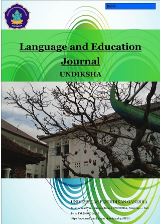AN ANALYSIS OF THE IMPLEMENTATION OF QUESTIONING STRATEGY IN EFL LEARNING DURING COVID-19 PANDEMIC
DOI:
https://doi.org/10.23887/leju.v5i1.34323Keywords:
Questioning Strategy, Questions, Students' opinions.Abstract
This study aimed to analyze the types of questions used by the teacher and how the questioning strategy is implemented in EFL learning and analyze students’ opinions toward the implementation of questioning strategy in EFL learning conducted at SMAN 1 Sukawati during the pandemic situation. The English teacher and the twelfth-grade students at SMAN 1 Sukawati was the subject of this study. This study used an embedded mixed-method design with qualitative dominant. This study showed that the teacher used all types of questions proposed by Richard & Lockhart (1996) and Padmadewi et al. (2017). Those are procedural, divergent, convergent, compliance, rhetorical, prompting, and probing questions. The result also showed that the teacher frequently used low-order questions in EFL learning. Those questions occurred in three sessions; pre-activity, main activity, and post-activity. Further, there were two learning management system used by the teacher, namely WhatsApp and Google Form. Besides, the implementation of the questioning strategy also got positive responses from most of the students because it creates a better quality of teaching and learning process.References
Aimah, S., & Purwanto, B. (2018). The use of teachers’ questioning strategies to stimulate students’ critical literacy: A case of two English lecturers in Indonesia. Indonesian EFL Journal, 5(1), 27-36. doi: 10.25134/ieflj.v5i1.1608.
Creswell, J. W. (2012). Educational research: planning, conducting and evaluating quantitative and qualitative research (4th Edition). Pearson.
Döş et al. (2016). An Analysis of Teachers' Questioning Strategies. Educational Research and Reviews, 2065-2078, Vol. 11, No. 22, ISSN: 1990-3839, DOI: 10.5897/ERR2016.3014.
Fitriati, S. W., Isfara, G. A. V., Trisanti, N. (2017). Teachers' Questioning Strategies to Elicit Students' Verbal Responses in EFL Classes at A Secondary School. English Review: Journal of English Education, 5(2), 217-226.
Hamiloglu, K., & Temiz, G. (2012). The Impact of Teacher Questions on Student Learning in EFL. Journal of Educational and Instructional Studies, 1-8, Vol. 2, No.2, ISSN: 2146-7463.
Hasan, S. (2013). History Education in Curriculum 2013: A New Approach to
Teaching History. International Journal of History Education, 163-178,
Vol. 14, No. 2.
Miles, M. B., & Huberman, A. M. (1994). Qualitative Data Analysis (Second Edi). Sage Publication.
Padmadewi, N., Artini, L., & Agustini, D. (2017). Pengantar Micro Teaching. Depok: Rajawali Pers.
Richards, J. C., & Lockhart, C. (1996). Reflecting teaching in second language classrooms. Cambridge, England: Cambridge University Press.
Prabowo, A., & Alfiyanti, K. (2013). An Analysis of Teachers' Questioning Strategiess During Interacion in the Classroom: A Case of the Eight Grade SMP PGRI 01 Semarang. 40-53, Vol. 4, No. 1.
Sofyan, A. (2016). The Implementation of Scientific Approach in English Teaching Based on Curriculum 2013 in SMK Negeri 2 Sragen in the Academic Year of 2015/2016. Surakarta: Universitas Muhammadiyah Surakarta.










